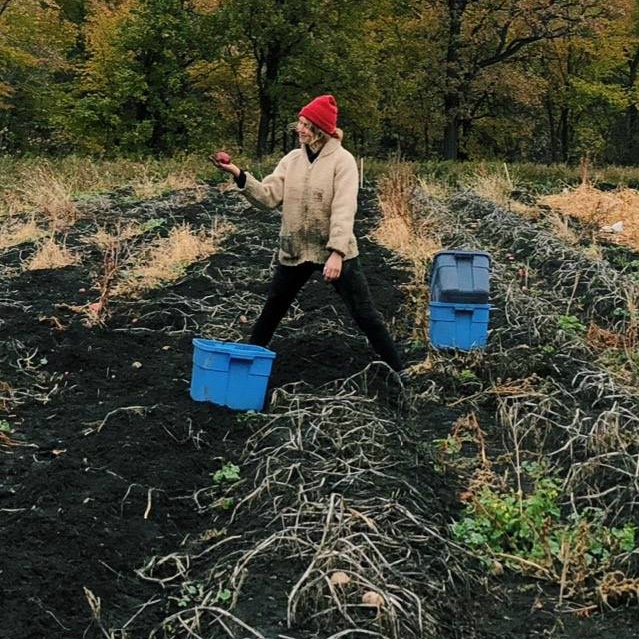News and Releases

Stories
Creation care as career: spotlight on alumni farmers (part 3 of 4)
Thursday, October 15, 2020 @ 10:00 AM | Stories
 Arianna Hildebrand
(photo courtesy Facebook)
Arianna Hildebrand
(photo courtesy Facebook)
The virtues of small: Arianna Hildebrand, Surrey BC
In the age of Climate Change the adage "think global, act local" is more freighted than ever. This alumna farmer is taking it to the bank.
Arianna Hildebrand (BA International Development Studies, 2018) has been farming on small eco-farms for the last three seasons. In just a few short years, she has fallen truly in love with the life:
"I've always been drawn towards jobs and hobbies that enable me to nurture something or someone," Hildebrand explains. "I also get bored easily. Farming on a small scale requires you to become many different people at once and boredom is not an option. You get to be an electrician, a soil scientist, a carpenter, an herbalist, a mechanic, a plumber, an accountant, an engineer, and a landscaper all in a day's work."
The spark first struck, she says, through her classes at CMU: "I found myself in a lot of classes at CMU centred around land," Hildebrand says. "Part way in, I took a pause from school and found myself in a Permaculture and Design course in Guatemala. After that I knew I had to put my knowledge and my tending instincts into the soil. I went back to school and graduated with my BA in International Development, then began working and expanding my eco-literacy on various small farms, mostly organic, in Manitoba."
This summer, Hildebrand moved to Surrey, BC with her partner, Tim, to live in a tiny house on a 1.5 acre urban farm that now comprises Hildebrand's work-a-day life. She spends her time "seeding, weeding, planting, pruning, irrigating, harvesting, processing, composting, and everything in between."
One weekend a month, Hildebrand and her partner take on full supervision of the farm, irrigating the fields and monitoring temperatures in the greenhouses, so the owners can get some Sabbath. Call it respite for land-workers. In exchange, she and her partner live in the on-site tiny house for all-but free. It's a golden arrangement of mutual aid in a city where such stability is hard to come by.
Surrey is part of the greater Vancouver metropolis, a place The Narwhal recently described as experiencing "a cascading number of crises": opioids, sky-high cost of housing and living, climate change—including the recent smoke emergency carried up from the wildfires in the Western US—and now, a pandemic. "A babushka-doll of never-ending concern."

Arianna Hildebrand (far right) with CMU alumni Nicholas Rempel (second from left) and Katie Daman (centre) during a funding announcement last year at the South Osborne Farmer's Market (operated by Fireweed Food Co-op).
All the more reason why sustainable, local, community-based agriculture projects like this one are starting to be recognized as essential, cutting-edge ventures. The problems and conditions of today are making on this crystal clear: small-scale farming is large-scale thinking.
"Small-scale agriculture is important to me, personally, because I can see and be a part of the whole picture. The intimacy you can have with your food and the way it grows is so important," says Hildebrand, who served as a board-member for Winnipeg's Fireweed Food Co-op before moving to BC.
"Of course, there are environmental and sustainability reasons for why I love small-scale agriculture as well—like low carbon emissions, less waste, the ability to pay fair wages, facilitate plant diversity, encourage soil-building and carbon sequestration. This work gives you so many opportunities to directly support and sustain your community."
To learn more about International Development studies at CMU, click here.
Read the rest of the spotlight on alumni farmers series...
Part 1 | Part 2 | Part 4
KEYWORDS: alumni, farming, Arianna Hildebrand

 Print This Article
Print This Article